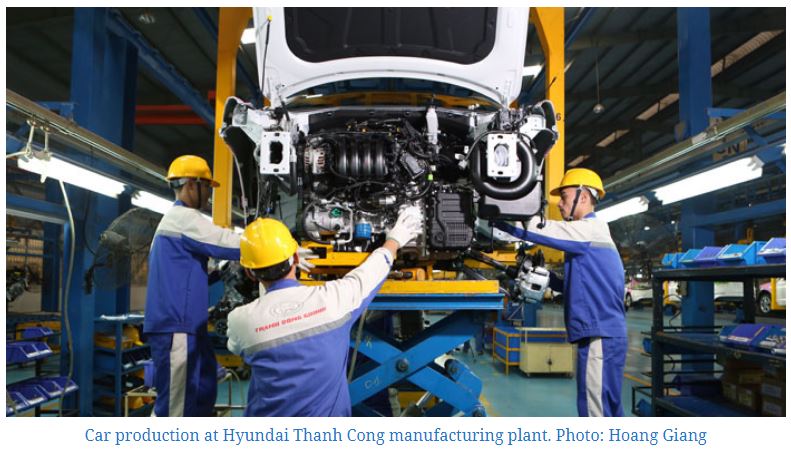Car prices in Vietnam set to be cheaper
The Hanoitimes – With the Covid-19 impacts still looming on local economy, domestic car prices have gone down but remained nearly double the prices of vehicles sold in Thailand and Indonesia, mainly due to high fees and taxes for locally made cars.
Rising domestic production capacity and existing government’s support policies to cut fees and taxes for locally made cars are expected to be major factors dragging down car prices in Vietnam in the coming time.
A representative from the Truong Hai Auto Corporation (Thaco), one of Vietnam’s leading car manufacturers, expected the country’s participation in free trade agreements (FTAs) with major partners, including the EU, Japan, UK and South Korea, would help further abate costs for importing car parts with import duty at 0%.
With the Covid-19 impacts still looming on local economy, domestic car prices have gone down but remain nearly double the prices of vehicles sold in Thailand and Indonesia, mainly due to high fees and taxes for locally made cars.
“High product quality and low base cost are essential for Vietnam cars to compete with their foreign peers,” said auto expert Nguyen Minh Dong, adding only a bigger market size could attract more investors to come in to produce cars in the country and enhance localization rate.
Director of Hien Toyota noted while car manufacturers can streamline operation to drive down the production cost, taxes and fees are dependent on state policies.
“Lowering taxes and fees for cars will no doubt reduce prices and bring more benefits for customers,” she said.
Booming market demand
A recent report from the SSI Securities Corporation suggested Vietnam’s income per capita is on the rise and set to grow at an average of 8-10% in the next decade.
“Compared to regional countries, the current income per capita is fast approaching to a point of bursting demand for cars,” asserted the SSI, adding cars would soon move from the luxury category with a passenger vehicle density of 34 per 1,000 to a more ordinary one with a density level comparable to countries in the region.
The SSI also pointed to a key factor that the domestic car market is big enough for car manufacturers to shift from importing cars to assembling/manufacturing domestically.
At present, six major car manufacturers of Thaco, Huyndai, Toyota, Mitsubishi, Ford and Honda account for 90% of the market share in Vietnam with a combined production capacity of 30,000-60,000 units per year, exceeding the break-even point for domestically-produced cars of 30,000-40,000 cars per year for an assembling plant, or 10,000-20,000 units for each car model.
According to the SSI, domestic car production capacity is increasing rapidly to meet customers demand, a key step to lower car prices.
With more cars manufacturing and assembling plants scheduled to complete in the 2022-23 period, the SSI expects a heating up car markets with steep discount policies would drive up domestic car demands.
Along with existing Vietnam’s support policies for the automobile industry, the National Assembly is currently discussing a possibility of reducing the excise tax rate for locally made cars, in which the specific reduced rate would be in line with the localization rate, aiming to boost sales of affordable car models.
Source: http://hanoitimes.vn/car-prices-in-vietnam-set-to-be-cheaper-316501.html


 English
English




